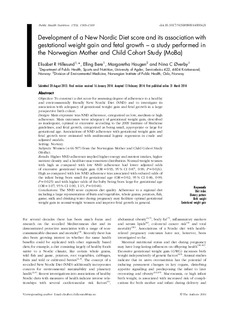| dc.contributor.author | Hillesund, Elisabet Rudjord | |
| dc.contributor.author | Bere, Elling | |
| dc.contributor.author | Haugen, Margaretha | |
| dc.contributor.author | Øverby, Nina Cecilie | |
| dc.date.accessioned | 2018-01-18T12:35:46Z | |
| dc.date.available | 2018-01-18T12:35:46Z | |
| dc.date.created | 2014-09-18T14:50:25Z | |
| dc.date.issued | 2014 | |
| dc.identifier.citation | Public Health Nutrition. 2014, 17 (9), 1909-1918. | nb_NO |
| dc.identifier.issn | 1368-9800 | |
| dc.identifier.uri | http://hdl.handle.net/11250/2478148 | |
| dc.description.abstract | Objective: To construct a diet score for assessing degree of adherence to a healthy and environmentally friendly New Nordic Diet (NND) and to investigate its association with adequacy of gestational weight gain and fetal growth in a large prospective birth cohort.
Design: Main exposure was NND adherence, categorized as low, medium or high adherence. Main outcomes were adequacy of gestational weight gain, described as inadequate, optimal or excessive according to the 2009 Institute of Medicine guidelines, and fetal growth, categorized as being small, appropriate or large for gestational age. Associations of NND adherence with gestational weight gain and fetal growth were estimated with multinomial logistic regression in crude and adjusted models.
Setting: Norway.
Subjects: Women (n 66 597) from the Norwegian Mother and Child Cohort Study (MoBa).
Results: Higher NND adherence implied higher energy and nutrient intakes, higher nutrient density and a healthier macronutrient distribution. Normal-weight women with high as compared with low NND adherence had lower adjusted odds of excessive gestational weight gain (OR=0·93; 95% CI 0·87, 0·99; P=0·024). High as compared with low NND adherence was associated with reduced odds of the infant being born small for gestational age (OR=0·92; 95% CI 0·86, 0·99; P = 0·025) and with higher odds of the baby being born large for gestational age (OR = 1·07; 95 % CI 1·00, 1·15; P = 0·048).
Conclusions: The NND score captures diet quality. Adherence to a regional diet including a large representation of fruits and vegetables, whole grains, potatoes, fish, game, milk and drinking water during pregnancy may facilitate optimal gestational weight gain in normal-weight women and improve fetal growth in general. | nb_NO |
| dc.language.iso | eng | nb_NO |
| dc.publisher | Cambridge University Press | nb_NO |
| dc.title | Development of a New Nordic Diet score and its association with gestational weight gain and fetal growth - A study performed in the Norwegian Mother and Child Cohort Study (MoBa) | nb_NO |
| dc.type | Journal article | nb_NO |
| dc.type | Peer reviewed | nb_NO |
| dc.description.version | publishedVersion | nb_NO |
| dc.subject.nsi | VDP::Gynekologi og obstetrikk: 756 | nb_NO |
| dc.source.pagenumber | 1909-1918 | nb_NO |
| dc.source.volume | 17 | nb_NO |
| dc.source.journal | Public Health Nutrition | nb_NO |
| dc.source.issue | 9 | nb_NO |
| dc.identifier.doi | 10.1017/S1368980014000421 | |
| dc.identifier.cristin | 1155770 | |
| cristin.unitcode | 201,18,2,0 | |
| cristin.unitname | Institutt for folkehelse, idrett og ernæring | |
| cristin.ispublished | true | |
| cristin.fulltext | original | |
| cristin.qualitycode | 1 | |
